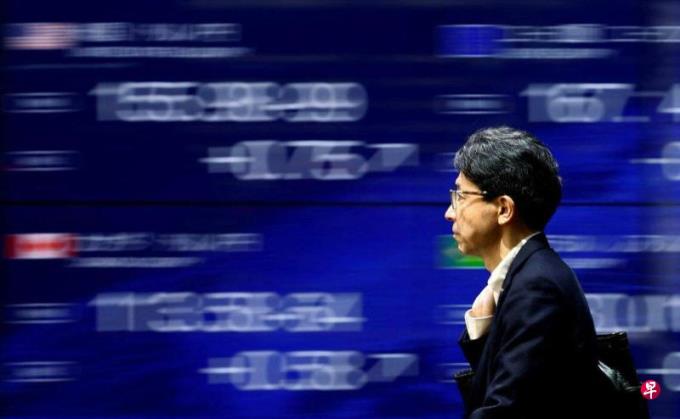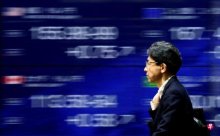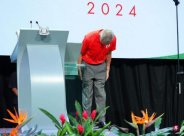
Once the Fed announces interest rate cuts, the interest rate difference of the US dollar on the yen will shrink, and a little expectations will bring huge market effects.It is expected that after the new U.S. government takes office next year, the issue of US debt accompanied by the US dollar issue will force the Fed to take action, and the policy turning will be imperative.After the last "one fall" of the yen, it may be appreciated to 120, 100 or 80 yen exchanged for $ 1.
The recent depreciation of the yen has attracted attention.On April 27, the $ 1 rose to 158.4455 yen, which was only one step away from the 160s that I published on April 29, 2022 in the Lianhe Zaobao review column article.
How can the exchange rate of yen exchanges the US dollar from more than 70 to 160, which is mainly related to the monetary policy of Japan and the United States and the international financial environment.Due to Japan's long -term negative interest rate policies and super loose financial measures, the Japanese exchange rate continued to decline has not been fundamentally reversed, and the hope of stopping decline is slim.The Fed's strong interest rate hike has led to the huge momentum of appreciation of the US dollar. The currencies of other countries have different degrees of depreciation of the US dollar, and the situation of the US dollar is very obvious.With the continued expansion of interest rates between Japan and the United States, Japanese government officials occasionally use verbal warning methods to prevent the yen from depreciating.
The euro and the pounds, such as the US dollar, also stepped up and hikes. The Bank of Japan only gave up negative interest rate policies and made a slight adjustment.Because the Japanese government is worried that the rate hike triggered a significant appreciation of the yen, debt sustainability may occur.Japanese Treasury bonds are mainly digested in Japan, unlike the liquidity of U.S. Treasuries in the world.Without signs that the Ministry of Finance of Japan and the Bank of Japan had an action on the devaluation of the yen, international risk aversion funds will also increase the short betting on the yen.Especially at the moment when the Russian -Ukraine War and Gaza conflict were constantly intensified, the risk aversion funds flowed to the United States to further push the US dollar exchange rate, making the yen relatively unfavorable.
The yen has depreciated to the lowest point in 34 years.Originally, I hope that the Fed will take interest rate cuts early this year to reverse the devaluation of the yen. However, because the domestic economic data in the United States and the poor economic situation, interest rate cuts are delayed by step than people's expectations.The Bank of Japan held a monetary policy meeting on March 19 to decide to end the negative interest rate policy.This is the first rate hike in the Bank of Japan in 17 years, and it also marks that Japan has maintained a super loose monetary policy that has been maintaining about 11 years.According to documents released by the official website of the Bank of Japan, the Bank of Japan decided to increase the policy interest rate from 0.1%to 0.1%of the range.EssenceThe reason why Japan stopped at zero interest rates is mainly because the Japanese government was on huge debt, and Japan's total debt at the end of 2023 was a record of 12.8645 trillion yen (about S $ 11.35 trillion).Even if the Bank of Japan wants to raise interest rates, it will be restricted in many aspects.
The policy of the Bank of Japan has not reversed the higher the US -Japan spread.In the current situation, the yen may only be depreciated with the dollar.Even if Japanese officials take foreign exchange intervention measures, under the current situation where the US dollar appreciation is dominated, it may have little effect.From historical experience, it is difficult for Japanese official foreign exchange intervention to reverse the depreciation trend of the yen, and it is more to slow down the depreciation speed.If both Japanese and American governments and currency officials have not adopted policy adjustments or market intervention, it may be that the depreciation of the yen may slip to $ 180 yen as a prediction of prediction two years ago.
So when will the yen reverse the depreciation trend?
The recent high attention of the international financial market on the exchange rate and some special measures taken by the central banks of various countries have reflected their vigorous vigilance in the US dollar.At the recent meeting of the Group Twenty Group Finance Ministers and the Central Bank President, Japan and South Korean Treasury Secretary said that they would take appropriate action to respond to excessive fluctuations in exchange rates.The significant depreciation of the Indian rupee, the Indonesian Shield, the Vietnamese Shield, and the Philippines Peso has also forced governments to take action.Once a non -US currency adopts a strong "currency defense war", a strong US dollar falls down the altar, and the currency and other currencies such as the yen will rise.Excessive fluctuations in the foreign exchange market are not desirable for any country's economy.
Besides, the US Federal Reserve's interest rate hikes stimulate the significant appreciation of the US dollar, not that the US economy has driven the US dollar to appreciate.U.S. economic data is not optimistic, and the Fed's continuous interest rate hikes have basically reached the end, and interest rate cuts are expected to be postponed because American inflation data is not ideal.However, the huge US debt under the high interest rate is a hot potato for the US government.U.S. bonds have remained high and rising for many years, which is a huge harm to the US dollar. Excessive credit overdrafts will cause severe anti -baying.The pusher of the depreciation of the yen is mainly the depreciation of the dollar.
From the time window of reversing the devaluation of the yen, the first is to pay attention to whether the Japanese government and the central bank have adopted large -scale market intervention operations on the devaluation of the yen.Japanese Minister of Finance, Suzuki Suzuki, said on April 23 on the devaluation of the yen on the US dollar, "For excessive fluctuations, it will not rule out any options and make proper response." It implies that the exchange market will interfere in the foreign exchange market to prevent the yen from further depreciating.In this regard, Japan is capable. The recent international capital flow report released by the US Ministry of Finance shows that in February this year, Japan held US Treasury bonds 116.79 trillion US dollars. Since its positioning in June 2019, Japan has been the largest US Treasury bonds.Overseas holding country.If the Japanese official sells a large number of dollars to purchase the yen, the yen will immediately rise and rebound.Of course, Japanese officials may not do this, and Japan has to look at the face of the United States.The United States opposes Japan's selling U.S. debt and does not allow Japan to throw a yen for dollars to curb the devaluation of the yen.
The second is to pay attention to the movement of the Federal Reserve.At present, the probability of the Fed's further interest rate hike is very small, and the question is when to cut interest rates.Once the Federal Reserve announces interest rate cuts, the interest rate difference of the dollar on the yen will shrink, and a little expectations will bring huge market effects.Before the US presidential election in November this year, the Fed's exchange rate policy will be quite cautious. After the new U.S. government takes office next year, the US debt issue will force the Fed to take action with the US dollar issue, and the policy turning is imperative.From a long -term perspective, the snowball -like expansion of the US debt, weak economic growth in the United States, and many challenges in the US dollar status.After the last "one fall" of the yen, it may be appreciated to 120, 100 or 80 yen exchanged for $ 1.
(the author is a researcher in Anhui Social Sciences)




